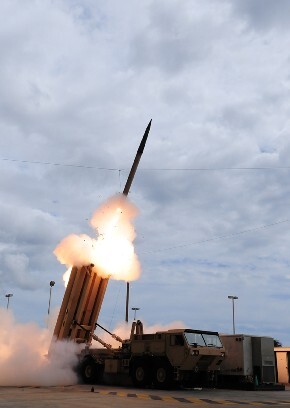hankyoreh
Links to other country sites 다른 나라 사이트 링크
North’s satellite launch may prompt South to agree to full participation in the PSI

The South Korean government is believed to be considering expanded participation in the U.S.-led Proliferation Security Initiative in anticipation of North Korea’s launch of what it says is a satellite sometime between April 4 and 8.
A high-ranking South Korean government official who is deeply involved in preparing countermeasures against the North’s planned launch, said on March 19 that “If North Korea launches a satellite as announced, the government’s policy on the PSI will change significantly.”
Another informed government official said, “Increased participation in the PSI is being reviewed as one of the options for dealing with the situation if North Korea goes through with its planned launch. Whether the North launches a missile or a satellite, the technology for weapons of mass destruction is used, so the need for us to participate in the PSI will reinforce our military capacity.”
In a recent interview with The Korea Herald, when asked whether the launch would prompt Seoul to consider full participation in the PSI, Foreign Minister Yu Myung-hwan said, “That is a possibility. If North Korea develops weapons of mass destruction and attains the capabilities, there will be a need to prevent the proliferation of that capacity. From this point of view, the launch may raise the need to review full membership.” But Yu added that the government would have to “be prudent” and give consideration to “the ‘special circumstances’ of the Korean Peninsula.”
South Korea is currently participating in the PSI in the status of observer, engaging in only five of the PSI’s eight activities. Full participation would mean that South Korea would participate in the remaining three activities: offering material support for arms interdiction drills within the region, providing material support for such exercises outside the region, and formally declaring its participation.
The officials’ remarks indicate that the government is actively reviewing whether to fully participate in the PSI and surveying its capacity to support interdiction exercises within and outside the region.
The United States launched the PSI in 2003, which aims to guard against the illegal transportation of weapons of mass destruction such as nuclear weapons and missiles. So far, there are 88 nations with full participation in the initiative. Though the United States has requested full South Korean participation since 2006, the government has so far declined to comply given the unique security environment on the Korean Peninsula.
If the government reverses its position and decides to participate fully in the PSI in response to the North’s satellite launch, political tensions on the Korean Peninsula could increase significantly, inciting fierce resistance from North Korea and the objection of China. In connection with this, a high-ranking government official said, “If North Korea launches a missile, the U.N. Security Council will begin discussions on sanctions. And if (South Korea) enters into the PSI, the political landscape on the Korean Peninsula will be in turmoil for a while.”
Please direct questions or comments to [englishhani@hani.co.kr]
Editorial・opinion
![[Column] Park Geun-hye déjà vu in Yoon Suk-yeol [Column] Park Geun-hye déjà vu in Yoon Suk-yeol](https://flexible.img.hani.co.kr/flexible/normal/500/300/imgdb/original/2024/0424/651713945113788.jpg) [Column] Park Geun-hye déjà vu in Yoon Suk-yeol
[Column] Park Geun-hye déjà vu in Yoon Suk-yeol![[Editorial] New weight of N. Korea’s nuclear threats makes dialogue all the more urgent [Editorial] New weight of N. Korea’s nuclear threats makes dialogue all the more urgent](https://flexible.img.hani.co.kr/flexible/normal/500/300/imgdb/original/2024/0424/7317139454662664.jpg) [Editorial] New weight of N. Korea’s nuclear threats makes dialogue all the more urgent
[Editorial] New weight of N. Korea’s nuclear threats makes dialogue all the more urgent- [Guest essay] The real reason Korea’s new right wants to dub Rhee a founding father
- [Column] ‘Choson’: Is it time we start referring to N. Korea in its own terms?
- [Editorial] Japan’s rewriting of history with Korea has gone too far
- [Column] The president’s questionable capacity for dialogue
- [Column] Are chaebol firms just pizza pies for families to divvy up as they please?
- [Column] Has Korea, too, crossed the Rubicon on China?
- [Correspondent’s column] In Japan’s alliance with US, echoes of its past alliances with UK
- [Editorial] Does Yoon think the Korean public is wrong?
Most viewed articles
- 1‘We must say no’: Seoul defense chief on Korean, USFK involvement in hypothetical Taiwan crisis
- 2N. Korean delegation’s trip to Iran shows how Pyongyang is leveraging ties with Moscow
- 3‘Weddingflation’ breaks the bank for Korean couples-to-be
- 4Korea sees more deaths than births for 52nd consecutive month in February
- 5[Column] Park Geun-hye déjà vu in Yoon Suk-yeol
- 6Will NewJeans end up collateral damage in internal feud at K-pop juggernaut Hybe?
- 7[Column] Has Korea, too, crossed the Rubicon on China?
- 8Amnesty notes ‘erosion’ of freedom of expression in Korea in annual human rights report
- 9Samsung barricades office as unionized workers strike for better conditions
- 10[Column] The clock is ticking for Korea’s first lady